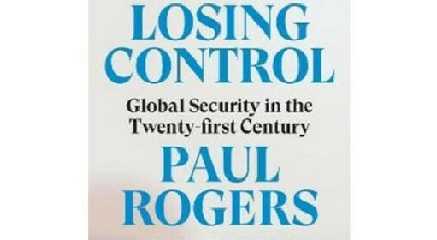
by Ramona Wadi
Pluto Press has published the fourth, and rewritten edition of Paul Roger's "Losing Control: Global Security in the 21st Century". The first edition was published a little while after September 11, 2001, which gave way to the US War on Terror and its aftermath.
The book delves into the elite's political hegemony and control and builds a narrative that includes the Cold War as the premise for the military-industrial complex. In the aftermath of the Cold War, the focus was on "keeping the violent peace," against perceived threats to the West, mostly unleashed against Middle Eastern countries in recent decades – Iraq, Afghanistan, and the North Atlantic Treaty Organisation (NATO) involvement in Libya as the Arab Spring got underway.
Rogers writes that Soviet leader Mikhail Gorbachev had once told a Western politician that "the Soviet Union was doing the worst thing it could to NATO, it was taking away its enemy." Other threats, specifically tied to nuclear power, saw the US construct purported threats from Russia, China, North Korea and Iran. With the collapse of the Soviet Union, NATO and arms manufacturers faced many uncertainties. The US, the author states, did not view nuclear power only as a deterrent and remained intentionally ambiguous on the non-use of nuclear weapons. Describing the Cold War as "dangerous and inordinately wasteful," Rogers notes that the nuclear arms race during the period was bolstered by political and military leaders who were "willing parties to a process of overkill that reached the level of a farce."
Different manifestations of power materialised in the aftermath of the Cold War. With the war in Iraq, the US sought to establish its military power, thus cementing its position in terms of influence. Yet the result of US and NATO foreign intervention in the Middle East in recent decades can be summed up as a cacophony of failures, and with implications in terms of security and humanitarian issues.
Rogers notes that the political security paradigm is mirrored in societies. "As marginalisation increased, the concern of the better off for their power and security also increased, showed by the growth across the world of gated communities and private security forces."
Rogers gives a detailed overview of how the War on Terror, upon which former President George W Bush built the US and global security narrative, no longer retained the impression of previous years after four failed wars in two decades: Afghanistan, Iraq, Libya and the military action against ISIS. As the West faced different threats on its home ground, notably across Europe, the action itself was perceived by political leaders as "religious fundamentalism or nationalism, with marginalisation rarely if ever seen as an issue." Typical to the neoliberal politics of exploitation, control was often the tactic used by the West to counter threats, rather than expounding upon the issues leading to violence.
As US allies faced attacks on their soil, the shift in support for US military action also altered. Post 9/11, the US found less cooperation for its war of Afghanistan, which was carried out under the pretext of eliminating the Taliban. Sympathy for the US existed, but not so much for warfare. The 9/11 attacks exposed the US weakness to paramilitary attacks and, Roger writes, regional support for Al-Qaida happened largely due to the existing marginalisation of the Middle East and South West Asia.
In maintaining exploitation and neoliberal politics, which has been dominant since the 1980s and which was bolstered by the fall of the Soviet Union, the West remained tethered to its failures, despite attempting to pass off its military actions as successes. Meanwhile the increase in global violence can be traced to a failing economic system, its impact upon the environment and a sophisticated security paradigm which only benefits the elite.
On a global scale, the socio-economic divide became evident in the accumulation of wealth by the right during the coronavirus pandemic. In this context, Roger writes, "neoliberalism has shown itself to be particularly unsuited to responding effectively." Even basic needs, such as access to food which is already a problem, was predicted to rise by the UN World Food Programme from affecting 60 million people to 130 million as a result of unequal distribution and the West's perpetual focus on the situation at home rather than implementing a global approach.
Moving forward, Rogers envisages further instability and violence based on extreme surveillance measures will become the norm if radical changes are not implemented. From the military-industrial complex and its influence in governments, to environmental and political challenges; the latter marked by the rise of the far-right, global transformation is inevitable.
The West is heavily reliant on maintaining its hegemonic control despite the fact that it has been challenged by far lesser powers to the extent that a rethinking of the security paradigm should have been implemented. Rogers writes, "There is a growing awareness that the dominant neoliberal economic system combined with the traditional security paradigm cannot meet the greatest challenge of our time, marginalisation and climate breakdown." Refusing to recognise this reality will inevitably lead to a downfall.




